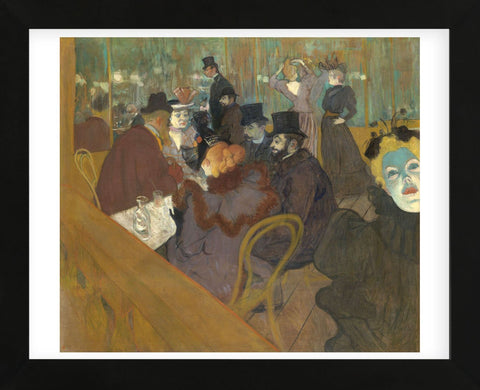Product Detail
- Overall: 16" H x 13" W x 0.75" D
- Overall Product Weight: 2.5lb.
- Material: Glass
- High-quality print on heavy paper
- Printed with vibrant, color-fast inks
- Framed in a contemporary style molding; available in black, gold, and white
- Sawtooth hanger
- Unmatted
Image is Copyrighted and Property of its respective owner
Product Detail
- Overall: 13" H x 16" W x 0.75" D
- Overall Product Weight: 2.5lb.
- Material: Glass
- High quality print on heavy paper
- Printed with vibrant, color-fast inks
- Framed in a contemporary style molding; available in black, gold, and white
- Sawtooth hanger
- Unmatted
About the Artist
Henri Marie Raymond de Toulouse-Lautrec Monfa was born in Albi, Tarn in the Midi-Pyrénées région of France, the firstborn child of Comte Alphonse and Comtesse Adèle de Toulouse-Lautrec. An aristocratic family (descendants of the Counts of Toulouse) that had recently fallen on hard times, the Toulouse-Lautrecs were feeling the effects of the inbreeding of past generations; the Comte and Comtesse themselves were first cousins, and Henri suffered from a number of congenital health conditions attributed to this tradition of inbreeding (see below). A younger brother was born to the family on 28 August 1867, but died the following year.
Throughout his career, which spanned less than 20 years, Toulouse-Lautrec created 737 canvases,
275 watercolors, 363 prints and posters, 5,084 drawings, some ceramic and stained glass work, and an unknown number of lost works. Toulouse-Lautrec is known along with Cezanne, Van Gogh, and Gaugin as one of the greatest painters of the Post-Impressionist period. His debt to the Impressionists, in particular the more figurative painters Manet and Degas, is apparent. In the works of Toulouse-Lautrec can be seen many parallels to Manet's bored barmaid at A Bar at the Folies-Bergère and the behind-the-scenes ballet dancers of Degas. He excelled at capturing people in their working environment, with the colour and the movement of the gaudy night-life present, but the glamour stripped away. He was masterly at capturing crowd scenes in which the figures are highly individualised. At the time that they were painted, the individual figures in his larger paintings could be identified by silhouette alone, and the names of many of these characters have been recorded. His treatment of his subject matter, whether as portraits, scenes of Parisian night-life, or intimate studies, has been described as both sympathetic and dispassionate.
Toulous-Lautrec's skilled depiction of people relied on his painterly style which is highly linear and gives great emphasis to contour. He often applied the paint in long, thin brushstrokes which often leave much of the board on which they are painted showing through. Many of his works may best be described as drawings in coloured paint.
After Toulouse-Lautrec's death, his mother, the Comtesse Adèle Toulouse-Lautrec, and Maurice Joyant, his art dealer, promoted his art. His mother contributed funds for a museum to be built in Albi, his birthplace, to house his works. As of 2005, his paintings had sold for as much as US$14.5 million.





